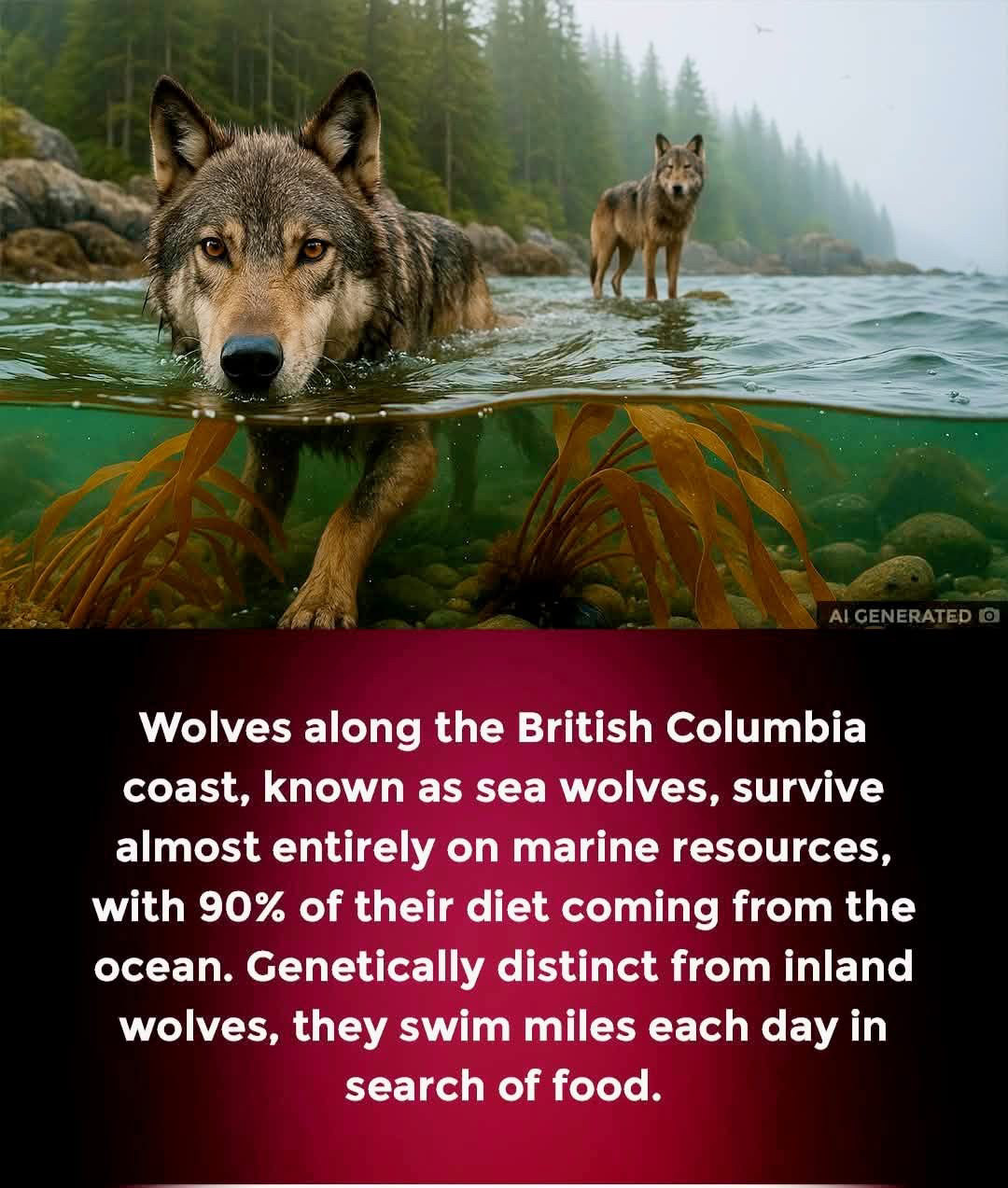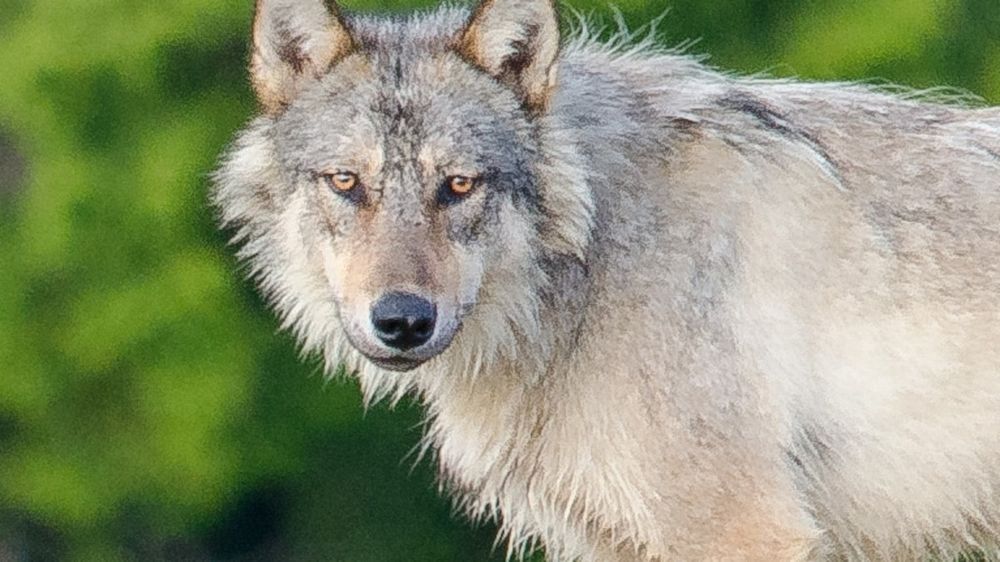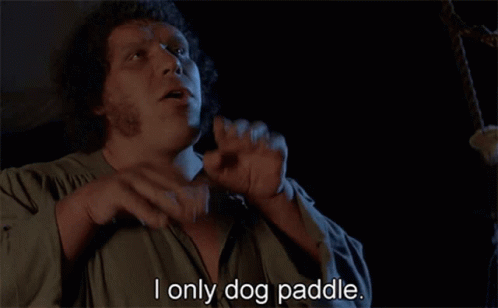Wolves along the British Columbia coast, known as sea wolves, survive almost entirely on marine resources, with 90% of their diet coming from the ocean. Genetically distinct from inland wolves, they swim miles each day in search of food.

Wolves along the British Columbia coast, known as sea wolves, survive almost entirely on marine resources, with 90% of their diet coming from the ocean. Genetically distinct from inland wolves, they swim miles each day in search of food.

I did not know that. TY.
Those fuckers gonna evolve into seals
😳😳Seawolves😳
www.nationalgeographic.com/animals/arti...

Unlike its interior cousins, gray wolves of Vancouver Island live with two paws in the ocean and two paws on land.
Beautiful!!
Fascinating. Thank you for sharing.

Amazing and beautiful
There's a great documentary on these guys. I just can't find the link.
Well, I’d love to visit British Columbia after if I could go back and visit Washington state, but I’m getting to the age. I’m not sure if that’s gonna be possible. !
We share this earth with such beautiful creatures.
I love wolves but honestly never knew this ! Amazing !
Wake up babe, new whales gonna drop in a million years
I did not know that. Interesting.
yeah we love the wolves but AI SUCKS
Whales evolved from sea-shore hunters somewhat like these.
That’s Ai crap?
Interesting thanks
I think there’s some kind of fishy about this.
They visit us fairly often near Desolation Sound never bothered our dogs once. Amazing to watch
In a million years they will be fully aquatic
Couldn't find any real photos?
Véritable photo à l’appuie évidemment
Nature is amazing. Thank you!
In nature, if you want to learn, follow the food.
In human nature, follow the money.
We humans are not 'natural' beings. In Earth's environment, we are odd, but significant.
Awesome
They are also genetically SO CUTE LOOK AT THEM!!!
These are related to mermaids, in the evolution.
📌
That’s so freakin cool
This is the same as my husky mix… accept it’s because she has poultry allergies and has learned passive aggression to instigate positive reward loops.
They mostly eat salmon, with other food like crabs, otters and seals making up a lot of their coastal and river diet, they will also however hunt black tailed deer.
I live in the Northwest and I’ve never heard of this ….
Metal af
Thank you! I never knew this before! If I just take a little time to look, I learned something new every day.
Giving me River Clan vibes. If you know you know.
Very special Wolves.
Check back in a few million years for a new aquatic predator species
I learned something new today. 😊
We have amazing wildlife here on the island!!
Never heard of this and pretty cool💕
I watched a doc on Netflix about them a while back. It was surprisingly interesting. They’re pretty amazing.
I remember reading about this a bit ago! Yes- so way cool!! Thx for reminding me. 🥰
Didn't whales start out like this?
Not swimming in BC anymore.
I believe there is a Netflix documentary about these wolves. Very interesting!

I’m betting they also have a lower occurrence of cardiovascular disease as well. 🤣
We're witnessing evolution.
I like seafood too. Mah brothers, owwwww ouuuuu
Yeah, I watched a documentary about these dudes. They are super smart and strong. It's a rigorous life, being a Sea Wolf.
How cool is that?!
Sea Wolves! Neat ❤️
Interesting.
evolution only has 9 themes and one of them is "dog goes to water"
Why am I reading the same thing twice
I think this is how whales got started.
Ai generated wolf images 💀
Not a fan of the AI use here. But I was lucky enough to catch a glimpse of a rain wolf family one early morning while hiking the Nootka Trail last hear. They're extremely skittish so once they saw us they promptly left the beach and returned to the bush but it was genuinely a life highlight.
So that's where the term "Sea wolf" comes from
I had no idea. Thank you.
Really?
What's your source? I'm not going to panic until you can prove it.
That’s why we must protect our precious environment 🌎 Beautiful creatures like “ swimming wolves “ need a place to live !!!

This was our amazing sea wolf. 💔 youtu.be/ICiuHibGgr8?...
Huh! Who knew? Thanks for enlightening me
just when you thought it was safe to go back in the water.
showed my wife this shot, and she was thrilled Thank you from both of us
Amazing creatires!!😍🤗
In another 100,000 years, they'll evolve into wholes.
So cool!
😮 i learned something new today, and this time it did not make me sick! How interesting! Thx for sharing this!
📌
They even have webbing in their paws, evolution in progress 🐺🐺🐺
Wow, that's amazing. I never knew that. I learned something today...it's a good day. Thank you.